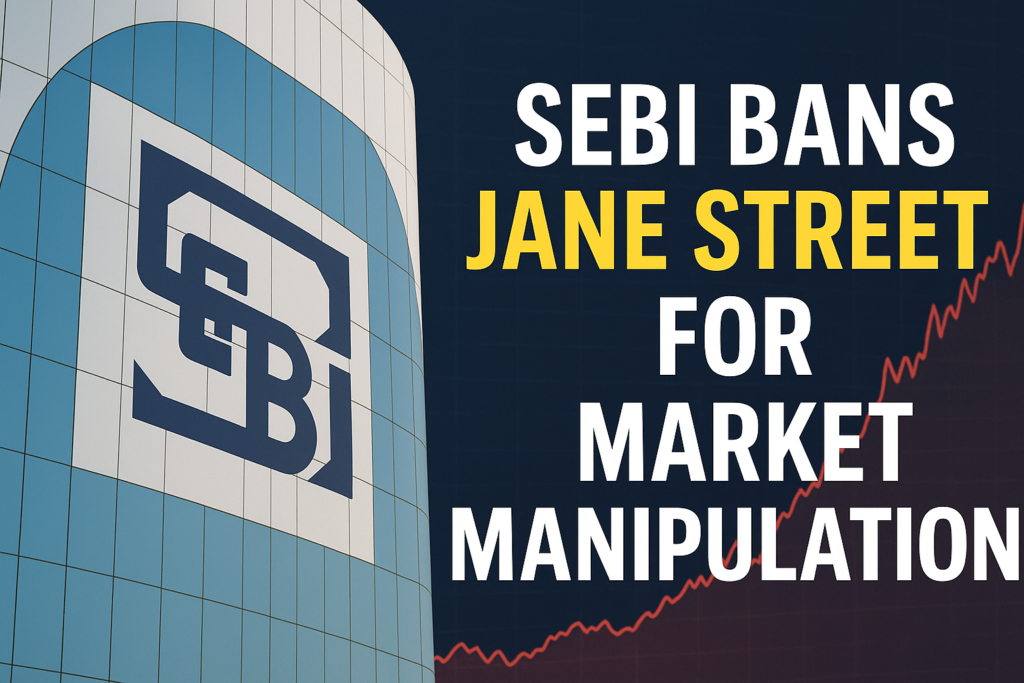SEBI bans US firm Jane Street Group for ₹36,500 crore fraud using algorithmic trading. Learn how high-frequency trades manipulated Indian stock markets.
SEBI’s Bold Move on July 3, 2025
On July 3, 2025, the Securities and Exchange Board of India (SEBI) passed a bold interim order, banning the US-based Jane Street Group from operating in Indian markets. The regulatory body accused the firm of committing a massive ₹36,500 crore (approx. $4.4 billion) fraud through market manipulation. This unprecedented action marks one of SEBI’s most aggressive stances against a foreign institutional investor.

Why Did SEBI Take This Step?
Jane Street Group and its affiliates allegedly manipulated stock indices in India. These manipulations helped them earn illegal profits while causing losses to ordinary investors. But before understanding the fraud, let’s first understand who Jane Street is.
What is Jane Street Group?
Founded in 2000, Jane Street Group is a prominent US-based trading firm that engages in proprietary trading, meaning it trades using its own capital instead of clients’ funds. The company specializes in high-frequency trading (HFT) and algorithmic strategies, operating across the US, Europe, and Asia. With over 2,600 employees worldwide, Jane Street is known for its sophisticated quantitative models and automated market-making systems.
How Does Jane Street Operate in India?
In India, Jane Street functions through four entities:
JSI Investment Pvt Ltd.
JSI2 Investment Pvt Ltd.
Jane Street Singapore Pte Ltd.
Jane Street Asia Trading Ltd.
What is Algorithmic Strategy and High-Frequency Trading?
To understand how Jane Street allegedly manipulated markets, it’s essential to know the tools they used.
Algorithmic Strategy
An algorithmic trading strategy is a pre-programmed set of instructions or rules used to execute trades in the financial markets. These rules are based on various factors such as timing, price, quantity, or even mathematical models.
For example:
An algorithm might be set to buy shares when a stock drops by 2% and sell when it rises by 3%.
Algorithms can analyze vast amounts of market data in real-time, making decisions faster than a human trader.
Such strategies help in:
Removing human emotions from trading decisions
Executing complex trades with precision
Taking advantage of micro-level price differences
High-Frequency Trading (HFT)
High-Frequency Trading is a subset of algorithmic trading where computers execute thousands or even millions of trades within seconds.
Key features of HFT include:
Ultra-fast execution speed (in microseconds or milliseconds)
Large number of small trades done throughout the day
Use of powerful computing systems and low-latency connections to stock exchanges
HFT firms like Jane Street use these techniques to:
Exploit price inefficiencies before others can react
Gain a competitive edge by being first to act on market signals
Make money from bid-ask spreads and short-term market movements
How Did Jane Street Allegedly Earn ₹36,500 Crore?
Between January 2023 and March 2025, Jane Street reportedly earned ₹43,289 crore through index options trading, especially in Bank Nifty. Although they incurred some losses in stock futures and cash equity segments, the net profit stood at ₹36,502 crore. SEBI’s 105-page order highlights two specific manipulative trading strategies:
1. Intraday Index Manipulation Strategy
SEBI provided a detailed example from January 17, 2024, the day Jane Street made its highest single-day profit of ₹734.93 crore.
What Happened on That Day?
In the morning session, Jane Street aggressively purchased large quantities of Bank Nifty stocks such as HDFC Bank, ICICI Bank, and Axis Bank in both the cash and futures markets. This sudden demand drove stock prices higher, pushing the index up.
Later, Jane Street sold off those shares, causing a sharp decline in the market. They used call and put options strategically to earn profits:
In call options, they bought shares at ₹40 and sold at ₹50, making a ₹10 profit.
In put options, they sold shares at ₹50 and bought them back at ₹40, again profiting ₹10.
By artificially inflating and then crashing stock prices, Jane Street pocketed huge gains, while retail investors suffered losses.
2. Extended “Marking the Close” Strategy
The second manipulation technique involved timing trades near market closing hours, especially on options expiry days.
How Did It Work?
SEBI noted that Jane Street traders deliberately influenced stock prices just before the market closed, maximizing their gains from expiring contracts. These trades were:
Executed in short bursts
Timed with expiry moments
Focused mostly on Bank Nifty options, generating ₹17,319 crore profit from that segment alone
Across all segments, Jane Street earned ₹36,502.12 crore, as per SEBI’s findings.
What Rules Did Jane Street Violate?
SEBI accused the Jane Street Group of several serious violations:
Breach of PFUTP Regulations (Prohibition of Fraudulent and Unfair Trade Practices)
Misleading market participants, particularly retail investors who rely on index movements
Colluding across entities to manipulate market dynamics
Ignoring NSE warning letters sent in February 2025, which advised restraint in trading behavior
SEBI’s Strong Enforcement Measures
SEBI has issued interim orders under Sections 11(1), 11(4), 11B(1), and 11D of the SEBI Act. The orders include:
Banning all Jane Street entities from trading or accessing Indian securities markets
Freezing ₹4,843 crore of Jane Street’s assets in India
Providing the firm 21 days to respond or request a hearing
This move sends a clear message to foreign firms: No matter who you are or where you’re from, if you operate in India, you must follow Indian laws.
What Does This Mean for Indian Investors?
SEBI’s action strengthens trust in the Indian financial system. It shows that the regulator actively protects retail investors and ensures market fairness.
While ₹36,500 crore was earned through manipulation, that money came from ordinary Indian investors. Such strong action assures them that SEBI is watching closely, and violators—foreign or domestic—will not be spared.
What More Can Be Done?

Instead of acting after damage is done, SEBI should:
Enhance real-time monitoring
Implement more robust fraud detection systems
Prevent retail investor losses before they occur
Jane Street’s Response to SEBI’s Allegations
Jane Street has denied any wrongdoing. In their official response, the company stated:
“We have not violated any laws.”
“All strategies used were legal and based on normal market behavior.”
They plan to appeal SEBI’s order before the Securities Appellate Tribunal (SAT) in India.
They respect SEBI’s concerns and have expressed willingness to fully cooperate with Indian authorities.
What Could Happen Next?
Looking ahead:
SEBI may introduce stricter regulations to detect and prevent real-time fraud
Foreign firms operating in India might face tighter compliance checks
SEBI could enhance its surveillance technologies, benefiting Indian markets in the long run
Conclusion: A Landmark Decision by SEBI
SEBI’s crackdown on Jane Street marks a historic regulatory action in India’s financial markets. It sends a message across the globe: India values transparency, and no market manipulation will be tolerated. This case may also lead to more stringent norms for algorithmic and high-frequency traders, both local and international.
For Indian investors, this decision reinforces trust in SEBI’s commitment to maintaining a fair and safe market environment.
